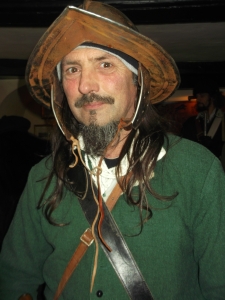Colonel William Sydenham was beginning to feel more confident now and on  Sunday 16th of February 1645, even ventured out of Melcombe with a troop of horse and succeeded in routing a unit of Royalist cavalry near Radipole, killing some and capturing forty five prisoners and eighty horses. He then “chased the little remnant that remained up to the gates of Weymouth”. Soon after, Dyve, with a detachment of Sir Thomas Austin’s and Cleveland’s horse and some companies of foot, tried to blockade the Roundheads in at the north end of Melcombe, but still Sydenham’s raiders managed to break out on several occasions. Once they returned with nine hundred sheep to feed the town and also a rather bewildered and no doubt embarrassed Cavalier captain, who had mistaken the Roundheads for his own side and rode up to greet them!
Sunday 16th of February 1645, even ventured out of Melcombe with a troop of horse and succeeded in routing a unit of Royalist cavalry near Radipole, killing some and capturing forty five prisoners and eighty horses. He then “chased the little remnant that remained up to the gates of Weymouth”. Soon after, Dyve, with a detachment of Sir Thomas Austin’s and Cleveland’s horse and some companies of foot, tried to blockade the Roundheads in at the north end of Melcombe, but still Sydenham’s raiders managed to break out on several occasions. Once they returned with nine hundred sheep to feed the town and also a rather bewildered and no doubt embarrassed Cavalier captain, who had mistaken the Roundheads for his own side and rode up to greet them!
These halcyon days were but a brief respite though and soon enough the Parliamentarians’ luck began to take a downward turn once more, with the dire news that the infamous and much feared Royalist General, George, Lord Goring was approaching Dorchester. He was the typical Cavalier of fable, a loud, flamboyant ‘peacock’ of a man, but nevertheless a very experienced officer of national renown who had an ego every bit as big as his reputation. His soldiers were dreaded by all, due to their unfortunate habit of heartlessly plundering and vandalising every town that they entered. Once in control of Dorchester and true to form, they were duly let off the leash and ran riot, destroying among other things the ‘brew-house’ run by one Benjamin Devenish.
Goring’s force was made up of three thousand cavalry and fifteen hundred infantry and, once he had established himself in Dorchester, he headed straight for William Sydenham at the head of three thousand troops. Panic rang through the war ravaged streets of Melcombe as Sydenham’s garrison, already outnumbered by two to one, looked out upon the massive body of soldiers now marching to join those already encamped outside their walls.
Goring paraded his men up and down in a great show of strength with drums beating, trumpets blowing and flags waving, but, astonishingly, did little else. Instead of the expected onslaught, Sydenham and his men watched with some relief as Goring eventually marched off again towards Weymouth, where he spent the night as Dyve’s guest, leaving only a token force behind to dig an artillery position about two hundred yards from Melcombe, possibly somewhere between the present library and the northern end of Great George Street.
Sydenham, making the most of this reprieve, decided to provide a little show of his own and early the next morning, bombarded Goring’s newly dug ‘works’ and, in the true family tradition, followed this up by throwing open
the town gates and personally leading a cavalry attack upon it, killing several of the defenders and capturing many arms and tools.
A further two days passed but still Goring did not attack. Probably convinced in his own mind that the town could be taken at leisure, he had apparently returned to Dorchester with most of his number, having made his first mistake, that of underestimating Colonel William Sydenham and his men.

